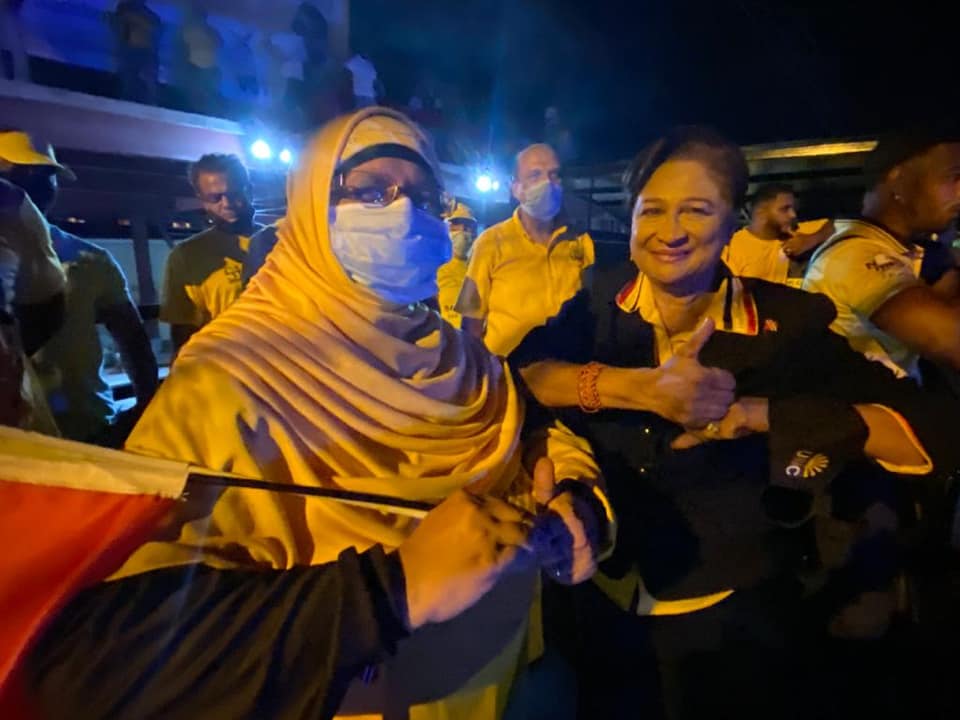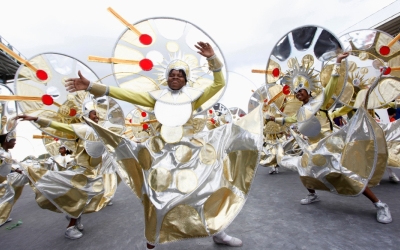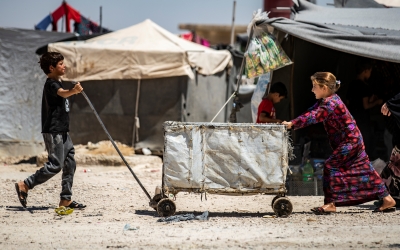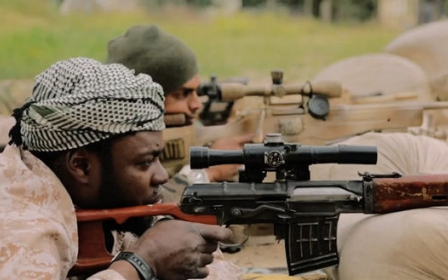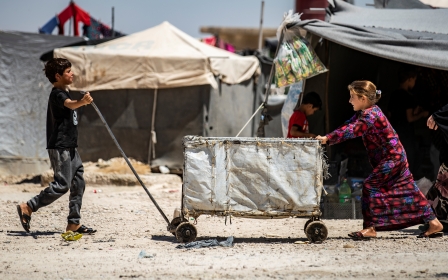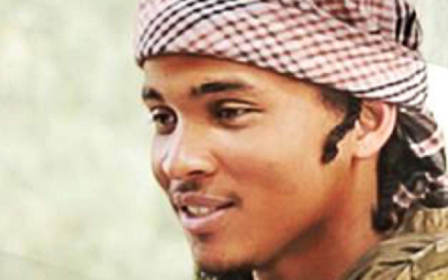Trinidad and Tobago elections: Muslim community at political crossroads
As voters head to the polls for Trinidad and Tobago's general election on Monday, the country's Muslim community finds itself at a political crossroads.
The 90,000-strong community has been rocked by a number of high-profile incidents since the ruling People's National Movement (PNM) came to power in 2015.
In 2018, armed police carried out raids on Muslim homes following what many perceive to be a cooked-up carnival terror plot, shattering community relations. Meanwhile, calls to repatriate nearly 100 women and children linked to the Islamic State group languishing in camps in northern Syria have mostly fallen on deaf ears.
As a result, one prominent Muslim PNM figure has accused her party of Islamophobia and come out to bat for the opposition. And citing grievances, some community leaders have called on Muslims to put the interests of the wider community first in Monday's vote.
However, there seems to be little agreement on what these shared interests actually are. Muslims in Trinidad and Tobago straddle ethnic lines and lie across social classes, from the powerful business magnates of the city of Chaguanas to the urban poor, whose tin-roof homes cling to the hills on the crime-ridden margins of the capital, Port of Spain.
Even so, as the two major parties go into the 10 August election almost neck and neck, analysts say that the Muslim presence in a few marginal battleground seats could be a factor in the eventual outcome.
Mohammedville
With a political system based on that of the UK, Trinidad and Tobago is dominated by two main parties: the PNM and the United National Congress (UNC). The PNM has historic ties to the African-descendent communities, while the UNC has links to Indo-Trinidadian communities.
Each community makes up a third of a population, which also includes indigenous peoples, mixed, Syrians and Chinese. Muslims make up more than five percent of the country's 1.4 million population.
According to pollsters, the two parties are likely to hold on to 15 seats apiece, out of 41 in total. Much of the campaign focus has therefore been on key swing seats, including Barataria/San Juan.
The bustling neighbourhood just outside the capital is the historic seat of the Mohammed clan, a Muslim Indo-Trinidadian political dynasty whose members hold such sway and are so numerous that the area where they reside is known simply as Mohammedville. Their number includes a founding member of the PNM and a former government minister with the same party.
In recent times the spotlight has fallen on Nafeesa Mohammed, a lawyer, one time senator and former deputy leader of the ruling PNM. She is one of the most prominent Muslims in the country.
In 2017, she was appointed as legal adviser to Prime Minister Keith Rowley. Within a year she was fired.
In February 2018, a series of pre-dawn police raids were carried out across her neighbourhood in connection with an alleged plot to bomb Trinidad and Tobago's famous carnival. According to eyewitnesses, families were tied up, children screamed and police dogs barked, as armed police forcibly entered properties and scaled the walls of a mosque with heavy weaponry in tow.
Thirteen Muslims were arrested, including Mohammed's nephew. As the plot unravelled, 11 were released without charge and two were charged with the relatively minor offence of possessing a gun-cleaning kit. Incensed, Nafeesa took to Facebook to claim that there was an anti-Muslim "cabal" operating at the heart of the ruling PNM. She was promptly sacked.
"It was due to the Islamophobia of those in authority that those raids were carried out, and innocent persons have been tarnished with the brush of terror," she told Middle East Eye.
Then last week, after two years in the political wilderness, Nafeesa formally quit the PNM and donned the yellow jersey of the opposition UNC, coming out in support of local candidate Saddam Hossein, a Muslim.
"It did not happen lightly," she said about her decision. "There was a lot of anguish and agonising. I think our fundamental rights and freedoms have been encroached. It's tyrannical in some instances."
In 2015, UNC won Barataria/San Juan by a margin of under 600 votes. Ahead of Monday's vote, polls say it is too close to call. But the seat is one of the few where Muslims are known to deliver a bloc vote, said Dr Indira Rampersad, a political scientist at the University of the West Indies.
'The mobilisation I saw there was massive, the opposition leader was there in a truck and it was like carnival'
- Dr Indira Rampersad, University of the West Indies
"Nafeesa Mohammed, to some extent, will carry some people with her [to the UNC]," said Rampersad, who predicts the UNC will hold on.
"The Muslim card has played very strongly there."
She added: "The mobilisation I saw there was massive, the opposition leader was there in a truck, and it was like carnival."
However, Rampersad said that the lack of religious polling in constituencies makes it difficult to know the exact effect of the Muslim vote, while some sections of the Mohammed family are also known to vote the other way.
Another swing constituency with a sizeable Muslim population is Chaguanas East, in central Trinidad, held by the UNC with a majority of just over a thousand. The area is home to Unruly ISIS, a notorious Muslim gang, which runs a mosque and has some draw among destitute youth.
But anti-government riots against police brutality last month means the group is less likely to get out and vote, Rampersad said. "I don't think the Muslim vote can make a difference there," she said.
Bloc vote
This contrasts with Moruga, a swing seat on the island’s battered southern coast, where Christopher Columbus' men first made landfall. There, the Muslim community has met with and backed the PNM candidate, Winston Peters, a famous calypsonian otherwise known as Gypsy.
As part of the trade-offs and hand-outs that precede elections, Prime Minister Rowley visited a Moruga mosque in mid-July to hand over documents for the construction of a Muslim cemetery nearby.
The Muslim vote may not prove decisive in Moruga, but one community leader said that such deals ought to be the norm throughout the country.
"Every [Muslim] community in Trinidad and Tobago should be doing that. I'm always advocating that a memorandum of understanding is signed so that when they get into power this is what they should give back to us," said Umar Abdullah, leader of the Islamic Front advocacy group.
"We very well can influence the election especially in the marginal seats," Abdullah added. "We have that kind of leverage when it comes to that."
But so do other groups. Swing voters among the African and Indian middle classes, which include some Muslims, have been known to hold the key to elections past.
Besides, diverse Muslim demographics make it harder for communities to act in unison. Business owners seek tax breaks, the poor seek a wider social security net.
Kwesi Atiba, an Afro-Trinidadian imam, said African-descendant Muslims were more likely to vote on issues affecting the wider African-descendant community.
"A lot of it comes down to the African community being mostly urbanised," he said, speaking from Laventille, an inner-city area regarded as the birthplace of steel-pan music but now increasingly seen as a byword for inner-city decay.
"They have the same problems as other urban African communities. Some have got themselves into gangs, while others are seeking employment and educational opportunities. Crime and safety is another important issue," he said, adding that some Muslims also choose not to vote for religious reasons.
When the Muslim community has come together it has tended to be reactive, Atiba said, and mostly on single issues, such as against the striking down of a legal provision that allowed Hindus and Muslims to marry young.
"The Muslim community has never recognised themselves as a bloc," Atiba said. "Everyone does whatever they want."
'The Muslim community has never recognised themselves as a bloc'
-Imam Kwesi Atiba
As a result, said Abdullah, there has been little progress on areas of common interest, including Islamic banking or the introduction of a national hijab policy to protect women against workplace discrimination.
But like Nafeesa Mohammed, Abdullah regards the Muslim community as being under almost perpetual siege, and suggests this may draw the community together somewhat.
"The changing political circumstances are forcing people to vote more strategically," he said, before listing a number of grievances, including the problem of people stuck in Syria and the raids following the so-called carnival bomb plot.
Perhaps sensing this, the opposition UNC has vowed to rescue the hundred or so nationals held at Kurdish-run camps in northeast Syria, following years of seeming governmental intransigence on the issue.
Rampersad said the sense of collective grievance "will be simmering in the minds of the voters" come Monday, but stopped short of saying that these were ultimate priorities.
Even so, the Hindu-dominated UNC has not escaped accusations of Islamophobia. In 2011, during a UNC administration, a group of Muslim men were arrested under state of emergency powers, accused of plotting to assassinate then prime minister Kamla Bissesar-Persad, who is running again in this election.
'Who is the party or which representative would be less inclined to oppress you when calls are made to address a terrorist threat or a criminal threat?'
- Umar Abdullah, the Islamic Front
After spending months in custody, the men were released without charge. Rowley, who was then the leader of the opposition, dismissed it as "hysterical, political expediency". Some of the men later left for Syria to fight, and it has been suggested that the high-profile arrests may have paved the way.
Mohammed defended her new party against claims of Islamophobia. "Mistakes were made at the time," she said. "In my view a lot worse happened under the PNM."
Abdullah is less optimistic. He feels things are now at the point where Muslims must simply choose between the lesser of two evils.
"Who is the party or which representative would be less inclined to oppress you when calls are made to address a terrorist threat or a criminal threat? Who will come to use force and derogatory tactics to attack the Muslim community? UNC was guilty of that, the PNM was guilty of that," he said.
For his part, Atiba doubts such incidents will be on Muslim minds come tomorrow.
"People won't react unless it directly affects them," he said.
Atiba rejected charges of Islamophobia against the ruling PNM, putting the carnival terror plot arrests down to governmental "error" and the influence of the United States, which reportedly provided the intelligence.
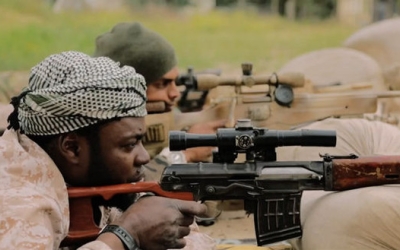
'Ethnicity is our ideology'
In the past few days, a race row erupted after the UNC released election adverts in an attempt to woo Black urban voters.
In one video advert, a Black woman left unemployed by the economic collapse brought on by the coronavirus pandemic can be seen begging and is then offered a bunch of bananas by a stranger - a known racial slur. In another, a bruised Black woman, helplessly wandering through a neighbourhood wearing just a soiled t-shirt, faints and is then rescued by the welcoming arms of a UNC party figure.
Rowley called the ads "racist" and has demanded their removal. Atiba agrees. "There is an element of racism in the UNC. You can't avoid it, it's there. These racist ads have made it so much more plain, if you just look at."
In response, opposition leader Persad-Bissessar first claimed she hadn't seen the ads, then accused the prime minister of being "desperate". She has in the past accused the PNM of demonising "the other," by which she meant the Indo-Trinidadian population.
Last year, a Netflix documentary accused the UNC of hiring British black-ops firm Cambridge Analytica to run a campaign to suppress voting among the country's African population in the run-up to the 2015 election. The UNC denied the claims.
'People say we lack ideology. It's not true. We vote on the ideology of race'
- Dr Indira Rampersad
Pollsters say that voter turn-out is likely to decide the election, but also that mixed-race voters and those from smaller ethnic groups are a crucial factor, for they account for 60 percent of undecided voters.
Still, with the country so evenly poised ethnically, Rampersad said that most voters, Muslims included, will likely vote along racial lines.
"People say we lack ideology. It's not true. We vote on the ideology of race," said Rampersad. "Ethnicity is our ideology."
Racial divisions "distract from the government making sound policies because they use the race card to gain votes," she said. "That's where we have problems."
Middle East Eye delivers independent and unrivalled coverage and analysis of the Middle East, North Africa and beyond. To learn more about republishing this content and the associated fees, please fill out this form. More about MEE can be found here.



